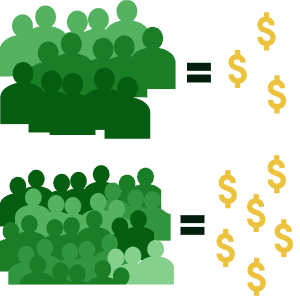This lesson will review the differences between broad and narrow niches: how to know which is which, if you’re venturing into either one of the extremes, and when you’ve hit the “just right” sweet spot so you end up with the best niche to make money.
Broad Niches
Dieting, Fitness, and Motivation are broad topics, NOT niches. These topics are entire industries. Don’t expect to succeed in Internet Marketing if you take on an entire industry.
Note: If you wrote down a broad topic during brainstorming, THAT’S FINE. The point of starting broad is being able to refine.
An important thing to note is the broader you go, the longer it takes to gain traction. The more information you’re trying to cover, the longer it’s going to take you to get search engine rankings, which means it’s going to take longer to get consistent traffic to your website.
How to Narrow Down a Broad Niche
“Men’s Fitness” is an example of a subject that’s too broad. Writing everything there is to write about men’s fitness means writing about different accessories and gear, types of workouts, exercise programs, shoes, supplements, celebrities within the industry, celebrity diets, and a lot more that’s related to this single subject.

If you try and cover all of the topics within “Men’s Fitness,” that’s, at minimum, one article per topic. Search engines, especially Google.com, are going have an extremely difficult time recognizing your site as an authority when your articles span so many different topics.
Instead, consider writing about a single topic that falls under “Men’s Fitness,” such as “Workout Supplements for Men.” While it’s a specific topic, it falls under the subject of Men’s Fitness” and gives you the opportunity to become an authority in that topic. You can write about powders, protein shakes, sleeping aids, the pros and cons of supplements, product comparisons, and product reviews. You can even write about possible health risks, if any.
You’ll establish yourself as an authority much sooner by selecting a topic within a subject rather than sticking with a broad subject. The sooner you establish yourself as an authority, the faster your search engine rankings will build. Notice that “Workout Supplements for Men” is narrower than “Men’s Fitness,” but still broad enough that you can write plenty of content.
Here are a couple of more examples within “Men’s Fitness” to give you an idea of how to narrow down a broad subject:
- “Men’s Fitness” narrowed down to “Home Fitness Equipment”
- “Men’s Fitness” narrowed down to “Kettlebell Exercises”
Let’s take a look at a different broad subject: “House Cleaning.” A few topics that fall under “House Cleaning” include the best ways to clean a bedroom, bathroom, kitchen, safest cleaning products, the best vacuum cleaners, etc.…you get the idea.

“Vacuum Cleaners” is still too broad because it’s an entire product category. However, it can be narrowed down to “Robot Vacuum Cleaners” (vacuums that automatically charge themselves and vacuum your house). You can write about different brands of robot vacuums, product reviews and comparisons, discuss their qualities, how well they clean compared to traditional vacuum cleaners, and much more. Now THAT could be a very good niche site.
Another example of a narrowed down niche that stems from “House Cleaning” is “Best Vacuums Under $100.” There’s a lot to be discussed within this topic, such as traditional versus bag-less vacuums, product reviews and comparisons, warranties, and how easy they are to maintain.
Keyword Identification
Another aspect of niche selection that’s seldom talked about, but merits discussing, is what I refer to as “Keyword Identification.” What I mean by this is: will your niche identify itself based on what is searched on Google?

If you came to me and said, “I’ve chosen Women’s Fitness as my niche,” I’d say, “that’s way too broad. You need to narrow it down.” Your response to that might be, “how about Exercises for Women, or Diets for Women Over 50 Years Old?”
While I can understand that train of thought, the reality is that not a lot of people are searching “Diets for Women Over 50” in search engines.
Kudos for narrowing down a broad niche to a smaller audience, but you won’t find that particular audience searching for terms like “Diets for Women Over 50” because they’re A) more than likely using general terms related to diet and fitness and B) not qualifying themselves by including their age in search terms.
If you can’t identify who is and isn’t in your audience based on the terms they’re using to search the internet for information, you haven’t actually narrowed that niche down in a viable way.
So, if you tried to narrow down “Men’s Fitness” to “Men’s Fitness for Men Over 50 Years Old,” you’re not going to find a whole lot of search terms. “Older Men” can range anywhere between 40 to 70 years old, so instead of focusing on the age, focus on the problems that audience might encounter:
- “Exercises That Are Easier on Joints”
- “Exercises for Older Men”
- “Exercises You Can Do When You’re Injured”
Terms like these open your audience up to people younger than 50 years old who may be injured, have gout, or arthritis.
Broad Niches: Revenue Cap
The broader the niche, the larger the audience, and the larger the revenue cap is going to be. If you only have an audience of about 30,000 people across the world, it’s going to be very difficult to get more than a few hundred or thousand dollars a month from that site. If your audience contains a million people, the revenue cap for that site increases.

Instead of earning $700 a month at maximum potential, you have the possibility of making $25,000 a month. There’s no way to accurately determine how much more you’re going to make, but just know (typically speaking) the broader the content you’re covering, the larger the audience, and the more earning potential that site is going to have.
How to Target a Broad Niche the Right Way
Even with everything discussed in the previous sections about refining a broad niche, keep in mind that there’s nothing wrong with building a broad authority site. If you absolutely want to, you can do it. You just need to do it the right way: step-by-step and bit-by-bit.
To build a niche site that covers a broad subject, like “Men’s Fitness,” buy a broad domain that’s closely related to that subject. Focus your content first on a topic that falls under the subject’s umbrella, such as “Workout Supplements for Men.” Over time, aim to dominate the supplement niche with content.
When you’ve done that, dominate and establish yourself as an authority in another topic, like “Men’s Exercise Gear.” When you’ve done that, dominate and establish yourself as an authority in another topic, and so on.
When building a broad niche site, tackle topics that fall under the subject’s umbrella one at a time instead of trying to dominate all of them at once. That’s the best and most successful way to establish a broad authority site.
Going Narrow: When is Narrow Too Narrow?
Choosing a niche that’s too narrow is just as bad as choosing a niche that’s too broad. Sometimes it actually ends up being worse. When a person realizes they have a niche that’s too broad, they can start focusing on one topic and ignore all others and still correct their course.
When a person realizes they have a niche that focuses on a single product or topic, there’s a big chance they have a domain that specifically ties them to a very narrow topic. This can restrict chances of expanding, and the usual course of action is to dump the site and start over with a new niche.

The reason you can’t get too narrow is because you’re going to have to write high quality, 1,200 to 1,500-word articles two or three times a week for the next several months (if not years) on this topic. When narrowing the focus from a broad topic, ask yourself, “how much can I really write about this topic?”
Let’s take selfie sticks as an example. How much can you really write about selfie sticks? Can you see yourself producing two or three articles a week for months or years on a topic like selfie sticks? I don’t think so.
How to Know the Niche You Chose is the Best Niche to Make Money
A general rule of niche selection is: if you can quickly identify 50 different article ideas for that niche, and dig into each one, then you have a good niche.

If 50 articles sound too overwhelming, think of it in terms of subtopics: can you think of five subtopics within that niche that you could dedicate at least 10 articles per topic to?
Or, can you think of 10 subtopics within that niche that you could dedicate at least five articles per topic to? If you’ve picked a niche well, you can probably do that pretty easily.
What Does Your Brainstorm List Look Like Now?
Review the list you put together at the beginning of the last lesson; you should be able to eliminate or refine a lot of those ideas by this point. If you’ve eliminated them all, that’s perfectly fine. Now you know how to really think about choosing a niche, knowing if it’s the best niche to make money, and when your search is over.
Do this process often enough (and you probably will if you’re looking at doing Internet Marketing for the long term) and someday you’ll have a refined sense of whether or not an idea is feasible when someone runs a niche past you. You’ll be able to quickly determine the strengths and weaknesses of a niche or its invalidity.
At the very least at this point, you’ve probably eliminated a handful of your ideas. However, this process goes significantly deeper, so don’t get too attached to any of your remaining ideas because you might have to cut them at one of the next few stages of elimination.
Again, that’s a good thing. The more ideas you cut at this point, the more likely it is that the idea you end up pursuing is something that’s really viable.